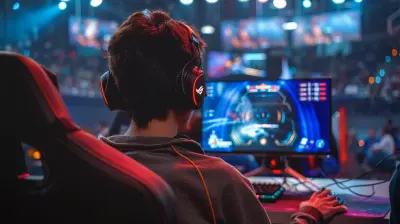Why Competitive Balance Suffers in Pay to Win Titles
5 September 2025
If you're a gamer, you've probably heard the phrase "pay to win" more times than you can count. And if you've actually played one of these so-called P2W (Pay to Win) games, then you already know how frustrating they can be. You grind for hours, strategize carefully, and improve your skills—only to get steamrolled by someone who simply whipped out their credit card.
Sounds familiar? Yeah, we've all been there.
In this article, we’re diving deep into why competitive balance suffers so badly in these pay to win titles. It’s not just annoying—it fundamentally breaks the game. So grab a controller (or your favorite snack), and let's dissect the chaos together.
What Does Pay to Win Really Mean?
Before we get too far, let’s clear something up: what exactly makes a game "pay to win"?In simple terms, a pay to win game is one where spending real money gives players significant advantages over others. And no, we’re not talking about buying cosmetic skins or cool emotes—we’re talking about buying powerful weapons, stat boosts, or exclusive access to higher-tier content.
Essentially, money equals power.
And that’s a big problem.
The Foundation of Competitive Gaming: Skill Over Cash
Let’s go back to what makes competitive gaming fun and, dare I say, fair.Every great competitive game—whether it's a shooter like Counter-Strike, a MOBA like League of Legends, or a battle royale like Fortnite—rewards skill, strategy, and teamwork. No matter how deep a player's pockets are, they can’t buy their way to the top. They have to earn it.
That’s the heart of competitive balance.
But when a game introduces mechanics that let players bypass challenges by spending money, it undermines everything. Suddenly, it's not about who's the better player—it's about who has the fatter wallet.
That’s where the imbalance begins.
The Tipping Point: Where Games Go From Fun to Frustrating
Pay to win mechanics don’t always hit you right away. Many games cleverly disguise them at the start. You’ll enjoy a few hours (or days) of fun, balanced gameplay. You might even win a bunch of matches and feel like a champion.But then you hit a wall.
You notice your opponents suddenly have overpowered gear, faster upgrades, or abilities that your grind hasn't even unlocked yet. You try harder, play longer—but nothing works.
Why? Because they paid to leap ahead. And unless you cough up the dough too, you’re stuck playing from behind.
It’s like trying to run a race where some runners can buy roller skates at the halfway mark.
Player Morale Takes a Huge Hit
Imagine this: you’ve trained, practiced, watched tutorials, learned every map, and optimized your gameplay. You go into battle and... bam! You're obliterated by someone who just started yesterday but spent $50 on in-game boosts.It doesn’t just ruin your game session—it crushes your motivation.
Pay to win systems make skilled but non-paying players feel powerless. And that leads to burnout, frustration, and eventually, quitting the game altogether.
No one wants to feel like they’re being punished for not spending money.
Communities Begin to Divide
One of the best things about multiplayer games is the sense of community. You meet people, form teams, and build friendships around a shared experience.Pay to win games? They tear that apart.
The player base splits into two camps: the “whales” (big spenders) and the “free-to-players.” The whales dominate leaderboards and competitive modes, while the rest are left behind, struggling to keep up.
This division fosters resentment and toxicity. Suddenly, it’s not just a game—it’s a battleground of class warfare. Not exactly the vibe you were signing up for, right?
Developers Walk a Fine Line (And Sometimes Cross It)
Now, to be fair, game developers need to make money. Creating and maintaining a game—especially an online multiplayer one—costs serious cash. Microtransactions are a common revenue model, and, when done right, they can be totally fine.But the problem is when developers prioritize monetization over balance.
In pay to win titles, design choices often revolve around encouraging spending. Want that premium weapon? Sure, you could grind for 80 hours... or buy it right now for $9.99.
The system is intentionally designed to frustrate you into paying. And that’s not just unethical—it’s anti-competitive.
Paywalls Become the New Skill Gaps
In balanced games, the gap between a beginner and a top-tier player comes down to skill. In pay to win games, that gap is often replaced by a paywall.Let me ask you: Would you rather get beat because your opponent outplayed you—or because they bought an invincible sword you can’t access?
Exactly.
When money becomes the deciding factor, true competition dies. It’s no longer about who’s best—it’s about who paid the most.
Long-Term Impact: Player Exodus and Game Death
Here’s the worst part: pay to win mechanics might bring in money in the short term, but they often destroy a game in the long run.Once the competitive balance is gone, skilled players leave. Content creators, streamers, and esports athletes move on to fairer games. The community gets hollowed out, matchmaking falls apart, and the game becomes a playground for rich newcomers and bots.
Before long, the game fades into obscurity.
It’s like a house built on sand—it might look solid at first, but eventually, it all sinks.
Some Not-So-Subtle Examples
We don’t need to name names, but let’s be real: you’ve seen these games.- Mobile strategy games where buying gems gives you instant troop upgrades
- RPGs where exclusive gear is locked behind paywalls
- FPS games where players can purchase game-changing attachments
- Sports games with loot boxes tied directly to player stats
In each case, the formula’s the same: pay for power.
And in each case, the competitive experience suffers.
The Psychological Trap Behind It All
You might be wondering: why do players even fall for these systems?Well, it’s not by accident. Many pay to win games are designed using psychological tricks to encourage spending. They play on your desire to win, your fear of missing out, and your frustration with repetitive grind.
It’s like gambling at a carnival—you think, "Just one more dollar, then I’ll win!" But the house always wins.
Only in this case, the “house” is the game dev team.
So, What’s the Solution?
Not all hope is lost. There are ways to fix—or at least mitigate—the issues with pay to win models.1. Cosmetic-Only Monetization
The best games make their money without affecting gameplay. Skins, outfits, emotes, and battle passes that offer visual flair without extra power? That’s the sweet spot. Everyone wins.2. Transparent Progression Systems
Players should feel like they’re making progress through effort, not forced payments. Clear, achievable goals help maintain motivation and fairness.3. Separate Competitive Modes
Some games create pay-to-play PvE environments but keep ranked PvP modes fair and balanced. It’s not a perfect solution, but it helps.4. Community-Driven Feedback
Developers who actually listen to their community tend to build better games. If enough players speak out against pay to win mechanics, studios might take notice.Final Thoughts: We Deserve Better
At the end of the day, games are supposed to be fun. They’re supposed to challenge us, connect us, and give us a fair shot at victory. Pay to win titles strip that away and replace it with an unfair, cash-grabbing experience that leaves a sour taste in everyone’s mouth.As a gaming community, we should keep holding developers accountable. Support games that prioritize balance. Speak out against broken systems. And remember: your time and effort should matter more than your wallet.
After all, victory tastes a whole lot sweeter when you’ve earned it—every last pixel of it.
all images in this post were generated using AI tools
Category:
Pay To Win GamesAuthor:

Audrey McGhee
Discussion
rate this article
2 comments
Rosanna Chapman
Great insights on competitive balance! It’s crucial for game developers to consider fairness to enhance player enjoyment and community engagement.
December 3, 2025 at 3:38 PM

Audrey McGhee
Thank you! Absolutely, maintaining competitive balance is essential for player satisfaction and fostering a vibrant gaming community.
Valencia West
Ah, the sweet aroma of pay-to-win games! Like bringing a bazooka to a pillow fight—sure, you’ll win, but where’s the fun? Let’s keep our battles fair and our wallets intact!
September 5, 2025 at 4:13 PM

Audrey McGhee
You make a great point! Pay-to-win mechanics undermine the joy of competition, turning skill-based play into a marketplace showdown. Fair battles should prioritize player skill over wallet size.


